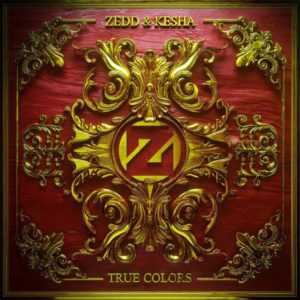
 It’s hard to believe how long it’s actually been since we last heard Kesha sing on a record. Three years have passed since Warrior, the kick-ass pop album that showcased the burgeoning artist’s unyielding hard rock sensibilities and solidified her strengths as a songwriter in the minds of fans and critics alike. It seemed like the start of an unstoppable career, but not long after that release, cold reality came crashing in. We’re all aware of the situation. Kesha was allegedly abused and raped by her producer Dr. Luke for nearly eight years and is currently fighting a losing legal battle over a contract that forces her to continue working with her abuser in the production of an additional five albums for Sony Music. Her new single, True Colors, was made independently of this agreement, with DJ and musician Zedd producing in place of Dr. Luke. In spirit, it represents a triumphant return for Kesha after her long and difficult absence. In content, it’s a declaration that she won’t give up without a fight.
It’s hard to believe how long it’s actually been since we last heard Kesha sing on a record. Three years have passed since Warrior, the kick-ass pop album that showcased the burgeoning artist’s unyielding hard rock sensibilities and solidified her strengths as a songwriter in the minds of fans and critics alike. It seemed like the start of an unstoppable career, but not long after that release, cold reality came crashing in. We’re all aware of the situation. Kesha was allegedly abused and raped by her producer Dr. Luke for nearly eight years and is currently fighting a losing legal battle over a contract that forces her to continue working with her abuser in the production of an additional five albums for Sony Music. Her new single, True Colors, was made independently of this agreement, with DJ and musician Zedd producing in place of Dr. Luke. In spirit, it represents a triumphant return for Kesha after her long and difficult absence. In content, it’s a declaration that she won’t give up without a fight.
First impressions make clear that this new track is an anthem. The curtain is pulled back on the raw emotional perspective Kesha had kept out of her music for years, and she’s not holding back as she belts it. The triumphant beat evokes Ennio Morricone at times, with percussion and bells producing a battle march against the misogynistic oppression Kesha has suffered. Listening to it through my own headphones this week has made me react with physical anger at times, and reminds me of what a tragedy it is that we’ve lost three years with a true artist. It’s remarkably different from the version Zedd originally released with Tim James’ vocals on his original record. By contrast, Kesha’s powerhouse vocals propel the song into new dimensions, providing the visceral, rebellious anger that her previous hits were known for and the contextual hardship that gives the lyrics a harsh resonance.
While her vocals suffer from some noticeable digitization for parts of this track, it’s a stylistic choice that Kesha has consistently made for herself, with criticisms being launched in her directions for the choice both in Animal and Warrior. Even in those songs, however, and especially in the Deconstructed versions, it’s clear that she has always had a remarkable voice. Keeping that in mind, her voice in True Colors sounds richer, deeper, and more powerful than in any Dr. Luke produced track. It’s a mix of Zedd’s production and the three years we’ve gone without hearing Kesha’s voice as she’s continued to develop, and in the culmination of it all is a song that truly sounds like it’s coming from deep within Kesha’s soul. Keep an ear out on sections like the final “it ain’t your rainbow” before the climax for a soaring presence that will rip your heart out in its authenticity as the genuine quality of her natural voice shines through.
Lyrically, it would be hard for anyone to interpret this song as anything but a shot across the bow at Sony and Dr. Luke, even if it originally appeared on Zedd’s album in 2015 without Kesha’s involvement. The version Kesha sings on comes with all the baggage of her publically exposed experiences that elevates the source material with a defiant feminist message. The choral lyric “I won’t apologize” stings, especially in light of the revelation that Sony would have let her out of her contract if she had apologized and lied about never being abused while under contract to their company. The fact that Kesha belts “I have no master” so brilliantly even while, contractually, she still does, is meant to impact as deeply as it does.
And that’s where the triumph of this track is really most heartbreakingly undercut. The song is a victory screech of battles won, but the real battle, the one she has been fighting continuously for the last two years, isn’t over. Kesha isn’t free. She wasn’t even able to record this track without permission from her current label, and a judge has actually ruled that she should not be let out of her contract because “not every rape is a gender motivated hate crime”. In True Colors, words like “I’ve escaped my capture. I have no master” are hopeful in their intent. There will come a day where she will be able to release music without chains connecting her to her former abuser, but for now it’s a harrowing reminder of how cruel the music industry can be.
The end of the song, in my opinion, is the most heartbreaking section. As Kesha’s vocals end, the notes that play through the outro of the song are identical to the ones that began it, reinforcing the cycle that the music industry is determined to continue in allowing producers to get away with criminal, morally reprehensible behaviour. For all the song’s fighting, it’s still a struggle for nought. Nothing has changed.
The Verdict:
Stream It. I wanted to say buy it. But as good as this is, as important as this is, I cannot recommend buying anything that will directly benefit Dr. Luke or RCA financially. It’s my personal moral choice that I’m sticking to, as much as it pains me not to be able to support her, I can’t do it in good conscience while I know it’s still supporting her abusers. I’ve already made public that I’m prepared to buy five copies of whatever album Kesha releases after being free. I hope it’s soon. The hopeful spirit of this songs deserves to lead Kesha towards freedom, not to serve as a good PR move for businessmen who value the revenue of a producer higher than the value of a woman’s life.


![[PODCAST] FANBOY POWER HOUR EPISODE 252: CON-VERSATION!](https://geekd-out.com/wp-content/uploads/2019/07/FanboyBanner-3-150x150.png)
